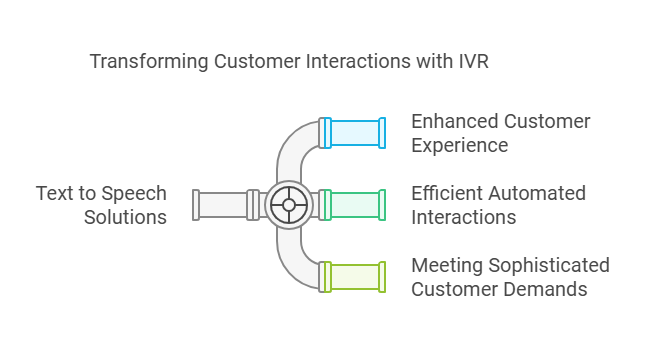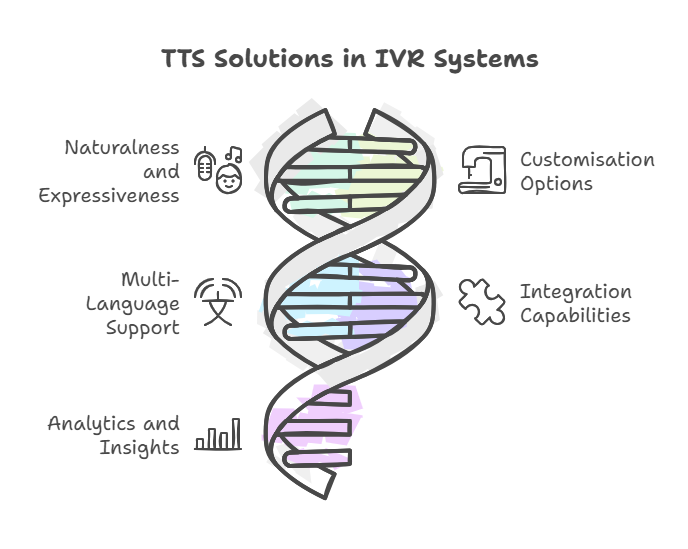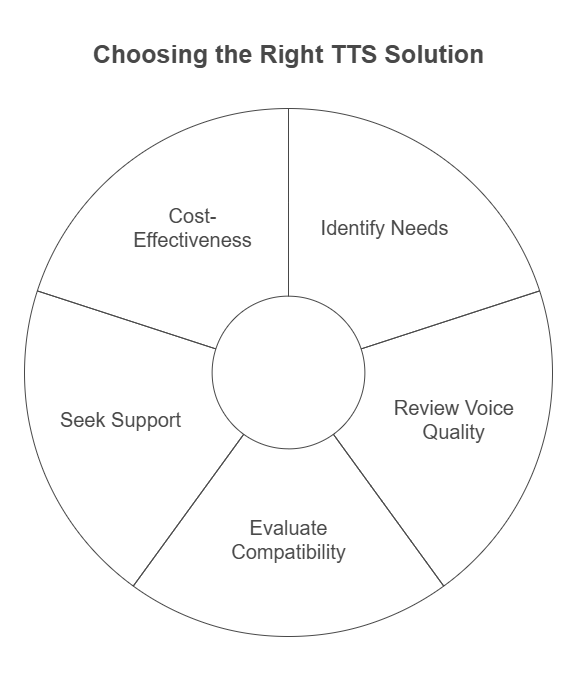
Text to Speech Solutions for IVR Systems are transforming the modern digital landscape where consumer expectations continue to reach new heights, as businesses strive to establish seamless communication channels that meet increasingly sophisticated customer demands. In this evolving environment, Interactive Voice Response (IVR) systems have become essential for enabling efficient automated interactions, requiring advanced voice technology that converts written content into natural, lifelike speech.

As organizations explore Text to Speech Solutions for IVR Systems to enhance their customer service capabilities, the emphasis falls on creating authentic, engaging voice interactions that can handle complex customer inquiries while maintaining a natural conversational flow. A critical aspect of implementing effective IVR systems lies in their ability to deliver clear, human-like speech that makes automated interactions feel more personal and accessible, ultimately leading to improved customer satisfaction and more efficient service delivery.
What is Text to Speech (TTS)?
Text to Speech (TTS) is a sophisticated technology that translates written text into spoken words. This transformation is increasingly present across an array of platforms to communicate information effectively in real-time. TTS empowers industries to automate their voice response systems, drastically improving service delivery while ensuring factual accuracy when disseminating information. Through TTS, businesses can enhance customer interactions and streamline operations.
How TTS Works
The operation of TTS delineates two primary functions:
Text Analysis: Initially, the technology processes the input text, examining and converting written words into distinct phonetic sounds and relevant audio characteristics. This stage lays the groundwork for intelligible speech.
Speech Synthesis: Subsequently, sound waves corresponding to the processed phonetic data are generated. This results in audio output that is both consistent and easily comprehended.
By finely analysing text and adapting to diverse contexts—such as altering intonation based on punctuation marks or accurately pronouncing numbers—TTS systems provide a more engaging and natural verbal output.
Benefits of Text to Speech Solutions in IVR
Integrating TTS technology within IVR systems significantly bolsters user experience. Here are some primary benefits to consider:
1. Enhanced Customer Experience
Authentic Voice Output: TTS engines produce realistic, nuanced voices that amplify communication, fostering more personal interactions.
Promptness: TTS enables rapid responses, shortening wait times and maintaining high levels of customer engagement.
2. Cost Efficiency
Rapid System Updates: Easily modify scripts without incurring the expense of hiring professional voice actors.
Scalability: Transition vocal changes across numerous languages or dialects without a substantial financial outlay.
3. Accessibility
Inclusivity: TTS technology allows differently-abled users, such as those with visual impairments, to navigate services using voice prompts effectively.
Support for a Multitude of Languages: Expand communication by employing multilingual TTS solutions, catering to a diverse clientele.
4. Uniformity and Accuracy
Consistent Messaging: Assure that your information reaches every caller uniformly, independent of the overall call volume.
Communication Errors Mitigation: Reduce the risks of inaccuracies associated with manual note recitations.

Key Features of TTS Solutions in IVR Systems
When evaluating an effective TTS solution for your IVR system, specific features and capabilities are essential.
1. Naturalness and Expressiveness
Seek solutions showcasing high-quality voice options, encompassing varied tones and accents to ensure the spoken output aligns with your brand’s identity seamlessly.
2. Customisation Options
Opt for TTS systems featuring customisation capabilities, allowing businesses to refine voices to mimic particular speakers or match branding requirements.
3. Multi-Language Support
Prioritize TTS engines adept in handling an array of languages, dialects, and pronunciations—particularly beneficial for enterprises operating across diverse regions.
4. Integration Capabilities
An ideal TTS solution must integrate effortlessly with your existing IVR framework and any supplementary communication platforms to maintain a coherent infrastructure.
5. Analytics and Insights
Advanced TTS systems should feature integrated analytics tools, providing valuable insights into user interactions and enabling data-driven enhancements to your IVR structure.
How to Choose the Right TTS Solution for IVR
Selecting the right TTS solution involves meticulous consideration of several factors:
1. Identify Your Needs
Application Type: Determine whether TTS is required for straightforward IVR inquiries or for complex customer services involving location queries or product information.
Volume of Calls: Prepare estimates of expected voice response volumes to identify solutions that appropriately adapt.
2. Review Quality of Voices
Trial samples of voice outputs from various TTS platforms to ascertain which system delivers a natural and pleasant auditory experience.
3. Evaluate Compatibility
Confirm that the TTS solution can integrate seamlessly with your current IVR setup, backend systems, and any customer relationship management (CRM) tools you use.
4. Seek Support and Documentation
Select providers offering robust support, complete with comprehensive documentation, a dedicated customer service team, and ample training resources enabling your staff to utilize the technology efficiently.
5. Cost-Effectiveness
Compare pricing amongst different vendors, considering not just the initial investment but also the total cost of ownership and potential savings due to increased efficiency.
Leading Text to Speech Solutions for IVR Systems
Here are some noteworthy TTS solutions to consider for your IVR implementation:
1. Google Cloud Text-to-Speech
Provides access to over 220 voices across more than 40 languages, delivering high-quality and lifelike speech outputs tailored to users’ needs.
2. Amazon Polly
Designed for developers, it allows the creation of applications that expressively communicate, enabling pitch and speaking rate adjustments, and harnessing deep learning for personalised user experiences.
3. IBM Watson Text to Speech
Offers personable voice outputs capable of eliciting emotional responses, making it effective in business communication scenarios that demand a human touch.
4. Microsoft Azure Text to Speech
Features extensive voice customisation along with advanced emotion-preserving capabilities, providing an added human nuance for deeper engagement.
Conclusion for Text to Speech Solutions for IVR Systems
To summarise, Text to Speech solutions are indispensable assets in contemporary IVR systems, facilitating superior customer service interactions while driving operational efficiencies and cost savings. Businesses integrating TTS technology can cater to their multilingual users, enhance overall community satisfaction, and fortify brand loyalty. When assessing a TTS solution, pay close attention to crucial factors such as the naturalness of the voices, product features, compatibility, and industry-leading providers to capitalize on the myriad benefits these sophisticated technologies present. A well-informed choice will not only empower IVR systems but also reaffirm a commitment to excellent customer service and operational excellence.
FAQ: Text to Speech Solutions for IVR Systems
Q1: What are text to speech solutions in IVR systems?
Text to speech solutions in IVR (Interactive Voice Response) systems convert written text into spoken words, allowing automated systems to communicate with callers in a natural sounding voice.
Q2: How do text to speech solutions improve customer experience in IVR?
By providing clear and understandable spoken instructions or responses, text to speech solutions enhance user interaction, reduce misunderstandings, and make the system more engaging for callers.
Q3: What are the benefits of using TTS in IVR over pre-recorded messages?
TTS allows for greater flexibility and scalability by enabling dynamic content generation, such as updates or personalized messages, without needing to record new audio for every change.
Q4: Are there specific technologies or tools commonly used for text to speech in IVR systems?
Yes, popular technologies include cloud-based TTS services from providers like Google Cloud Text-to-Speech, IBM Watson Text to Speech, and Amazon Polly. These tools offer various voice options and languages for diverse applications.
Link sources:
https://www.inconcertcx.com/en/blog/4-steps-to-implement-an-ivr
https://www.techtarget.com/searchcustomerexperience/definition/Interactive-Voice-Response-IVR


